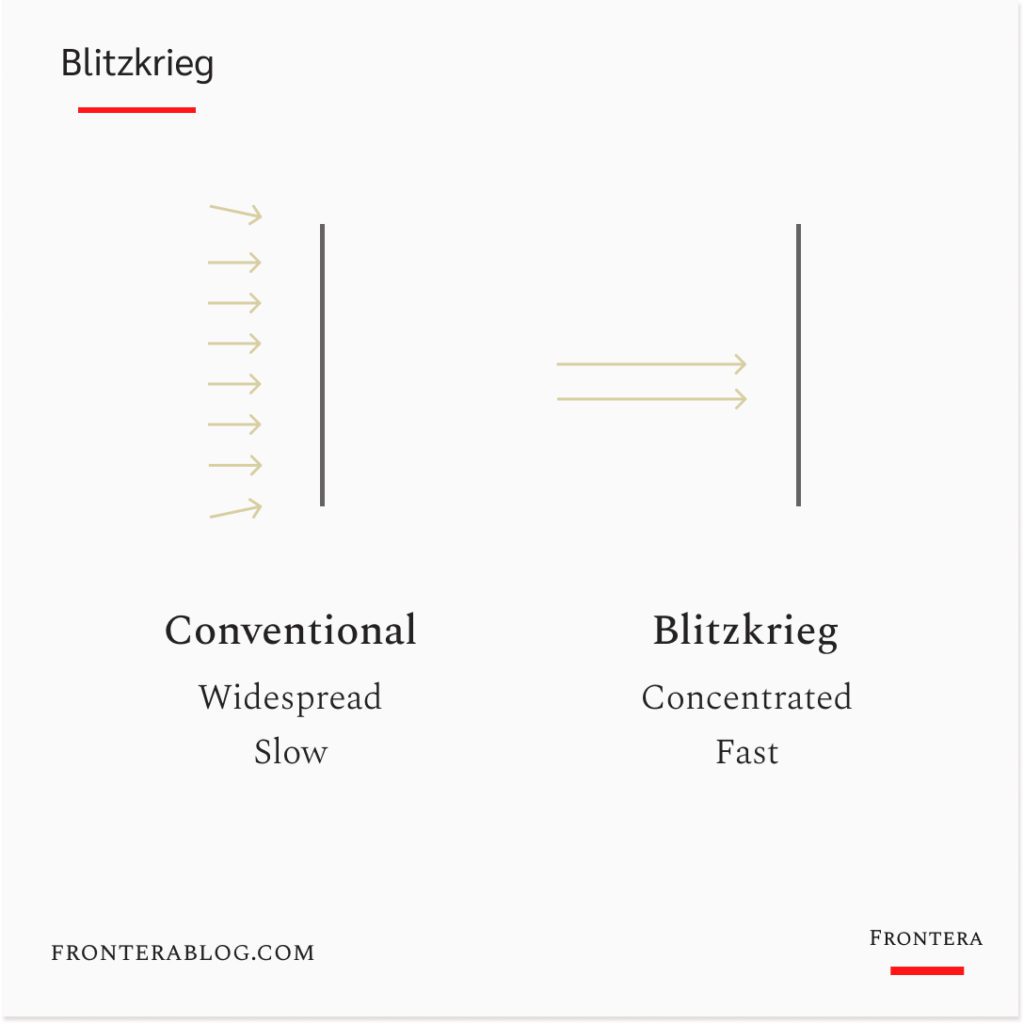The German army shocked the world when they entered Paris in 1940.
On paper, the French army was ready before the invasion.
They expected an attack.
So they bolstered their defenses for years.
They even built the “impregnable” Maginot line, a 280-mile-long fortification.
But the Germans defeated the French army in only 6 weeks.
How was it possible?
Well, Germans knew the conventional tactics would prolong the war and likely result in a defeat.
So they decided to use a shock tactic.
The Power Of Concentration
Press called this tactic Blitzkrieg (lightning war).
Instead of thinning out the forces on a large area, they concentrated all their power on one weak point.
After they broke the defense there, they rushed into French territory without stopping — ignoring all French troops on both sides.
When they reached deep into France, they cut communication and supply lines.
And encircled French troops that stayed behind.
This attack had to be quick to succeed.
So German soldiers used amphetamines to stay awake for days and move with little eating.
French soldiers fought hard at first, but soon Germans were everywhere.
In a couple of weeks, the German army captured Paris.

The fall of France shocked the world.
And it made Blitzkrieg a popular term to stress the importance of speed.
But speed was only one aspect of the tactic.
Three lessons from Blitzkrieg to beat bigger competitors:
1. Concentrate on a single point
The success of the tactic comes from focus.
All resources and efforts focus on one point, in a coordinated way.
When you focus all your energy on one priority, you multiply your chances of succeeding.
Even when the odds are against you.
Some examples:
Personal life:
If you try to build a business, get a six-pack and be a good parent at the same time, you’ll thin out your resources like the French army.
And run the risk of losing on all fronts.
You must choose a priority.
That priority can change over time.
But always have one single point to direct most of your energy.
And keep minimal resources in other areas only to maintain.
Business:
How do startups succeed against huge companies?
Yes, with extreme focus and speed.
Corporations have big budgets and thousands of employees.
But they work on dozens of products at the same time.
And they have approvals, committees, and compliance departments that slow things down.
Adobe is a behemoth.
But Figma won the war against them by focusing only on a collaborative user experience design tool.
So to beat Goliaths, focus all your energy on one product, service, or project.
2. Have a Clear Intent
Military missions always have a clear goal.
Germans’ intent was clear.
Break the defense from one point, go deep into France without stopping, and encircle their army.
All German army, from soldiers to generals, acted in their parts with this intent.
If field officers saw an opportunity to achieve this quicker, they had the authority to change orders.
So always have a clear goal.
If you have a team, let everybody know.
And make all actions intentional toward that single target.
3. Beware of Russian winter
Germans used Blitzkrieg also against the Soviets, one year later.
And at first, the results were like in France.
But it eventually became a disaster.
Why?
Well, the distance to Moscow was twice the distance to Paris.
Together with the Russian winter, the tactic lost its impact.
The Germans got slow.
And their forces spread over a vast area.
They continued pouring resources to succeed, but it was impossible.
In the end, they didn’t only fail to defeat the Soviets; but they lost the war.
Let me give a recent example.
Mark Zuckerberg is using Blitzkrieg on Metaverse.
He focused his army on a single target.
He changed the company’s name to Meta and is spending tens of billions of dollars to win the war.
He wants to beat bigger competitors —like Apple and Google— with a swift and concentrated attack.
Will it work?
From today, it looks more like Germans marching toward Moscow.
It’s a long journey, and winter is here — this week Meta lost 25% of its value on the stock market.
Time will tell if he’ll succeed.
So never stretch your resources too far and run the risk of ruin.
Extreme focus works best when the target is challenging but achievable.
Enjoyed this article?
Then you’ll love the How Brands Win Newsletter.
Get the “7 Positioning Sins That Cost B2B Brands Millions” guide when you join. It’s free.
